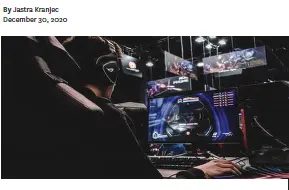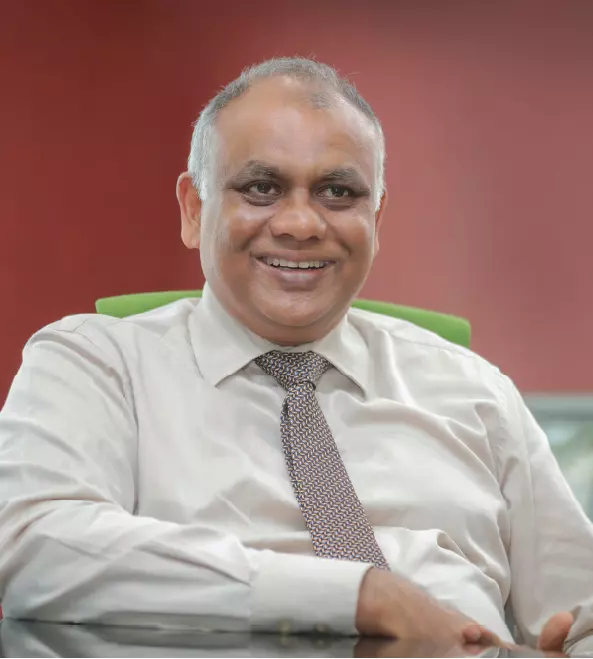
Gamini Abeywickrama, Chairman, Basilur Tea Export always looks at every situation positively. Challenges, he says is a learning experience, which he has proven through his unique brand and tea business, as well as in the hospitality sector with Riff Hikkaduwa. The Chairman emphasizes that positioning one’s brand correctly is essential to define the product and he says, it is of utmost importance for Sri Lanka’s tea and hospitality industries to reposition themselves to make the greatest impact. Always maintaining a low profile, Gamini Abeywickrama’s actions speak larger than words. He is confident that Sri Lanka will be able to emerge from the crisis and resume its growth journey.
By Udeshi Amarasinghe.
Photography Menaka Aravinda
How have you been able to conduct your tea business in this challenging environment?
Basilur is a niche product and the value-added sector is seeing a low period of business at this time. At the moment, consumers are looking at lesser priced alternatives. However, we cannot say that the situation is very bad. In general Ceylon Tea is faring at a satisfactory level. Compared to the previous years we can see about a 20 percent drop in exports. There are consumers who continue to look for quality and appreciate the product. That is why we are able to maintain our export levels compared to 2019, where it has not dropped drastically. In the niche market, consumers have brand loyalty. We did not make drastic changes in terms of our distribution or sales strategy. We simply continued with whatever we had, the only thing is that we could not conduct certain promotions in overseas supermarkets because of COVID-19. We did not make a huge change in our marketing or sales approach. We intensified our social media activities and online sales. We simply continued
to have the trust of our customers by maintaining the quality. We did not do any changes to our blends just because consumers were looking for cheaper teas. We stayed with our good quality product overall. We are mainly in the international market but have a very small presence in the domestic market.
In 2007 when you established the company, what was the thinking behind it? What was the thinking venturing into the overseas markets?
We initially focused on the gift market segment for tea in all the countries. Our concept was ‘tea as a gift’. We positioned our tea as a gifting product. We focused on upper level quality teas. Even in our distribution network we ensured that it catered to the niche market and not the mass market. There was this gap for very niche exclusive products because tea had become a general commodity for many brands in many countries. Therefore, we wanted to change that and also to bring in this experience and lifestyle in tea, rather than giving merely a commodity product.
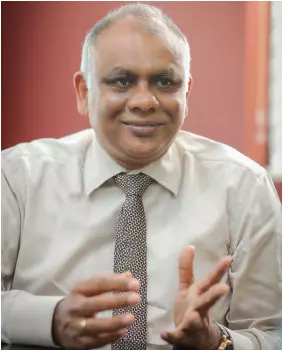
That is why we changed the design, the recipes, and tea blends where everything was unique. It was a totally new experience when we started 13 years ago. The gifting experience for tea was the gap that I saw when we established the company. That is where we started and today we have diversified into everyday tea segments as well. Yet, the core of the company remains. We still identify ourselves as an exclusive tea gifting company. But of course giving the customer the opportunity to have an every-day cup of tea as well. We are a tea company that is providing new lifestyle experiences. That is the gap we tried to bridge when we established the company in 2007 because we saw that niche products were missing in many tea brands. We provide great packaging, very innovative designs and unique tea blends that all came together to produce a wonderful product. We have created a profitable business for our importers as well, where we have kept a good margin for them to enjoy.
Many tea producers have a niche product as well as mass market product. But you have only a niche product. Why is that?
We want to market Sri Lanka as a brand, and what we can offer from Sri Lanka is better quality teas. There is immense competition in the international market for cheap quality teas from other countries but Ceylon Tea has its own unique characteristics. We want to sell premium Ceylon Tea. It is also to avoid the confusion in the minds of the consumer, because when you have a niche market product and mass market product under the same brand there is a confusion in the minds of the consumer in regards to the identity of the brand. That is why at Basilur we do not give two different qualities to our consumers. All our teas are niche, premium, and high-end. With Basilur we do not change the product, we always stay at the niche. Even if you go to overseas supermarkets the brand will be the niche of the mass market. We do not want to compete with mass market products using Basilur because we cannot do that with our quality and packaging, brand policies and marketing strategies.
Basilur has introduced unique products as well as unique designs, capturing the essence of the story. Can you elaborate on this?
This was because we positioned ourselves as ‘tea as a gift’. We have to be different from other brands and give a reason for people to purchase our products. At the beginning even the brand logo was not visible, it was only the design of the packaging that has attracted the consumer. That was because we wanted to score more on an innovative design than the less known brand at that initial stage. As a result, consumers went for our very unique designs that they never saw in a tea pack. Then gradually, the consumer started purchasing Basilur as a brand.
What are the markets that you export to? What is the situation in those countries and have you been able to maintain the supply?
We are currently shipping to 65 countries. We saw a drop in exports from March to June 2020, but it slowly picked up thereafter. Our main market is Russia, and then Poland, Ukraine and the USA. We can say that the level of exports to all markets are satisfactory. There are few issues in terms of shipping our cargo. At the moment many vessels are by-passing Colombo Port and since we have import restrictions Sri Lanka do not have many empty containers. Usually the transportation of goods happens on a rotational basis, where goods literally come and go. It is a cycle, when there are imports you have containers coming into the country, which we use to export our products. Therefore, the freight cost has almost increased by 100 percent. For example, we used to pay USD 2,000 for freight, now we pay almost USD 4,400. That is a huge impact. Earlier, about 70 vessels were coming into the country for a month, now it is about 15-20. Therefore, as exporters we are facing a huge problem.
How do you find your distributors and how interested are they in working with you?
Most of them have started as small family companies or startups. Over these 13 years we have grown together as a team. We call it the “Basilur tea family”. All our distributors are part of the family and they are very close to us. More than an importer/distributor relationship, they are more like our partners. There is a very strong bond between us and the distributors. For that they respect us, the brand and the company greatly. We have a very close relationship. That is one of the reasons for our success. We have groomed them from the beginning because they started their business with us. That is why there is a strong bond and we grow in our businesses together. Some of them started with just one pallet of tea, but today they are ordering a couple of containers a month. That is how we have grown together.
Basilur in the domestic market?
The Sri Lankan consumers may not have seen us much because we are not present in supermarkets. However, we have our presence in all the souvenir and gift shops, and hotels. We also have boutique stores in Sri Lanka; at the Colombo City Centre, Liberty Plaza, and another at our hotel Riff Hikkaduwa. We are hoping to open more stores in Sri Lanka, unfortunately due to the current situation we have not been able to proceed. We are looking at expanding our presence but again in providing new experiences to the customers. We do not want to be a supermarket product and be seen everywhere.
The visitors who come to Sri Lanka want to take our product as a gift, not as an every-day supermarket product that is why we do not want to position ourselves in that way. Once you become a supermarket product there is little or no value in presenting the product as a gift.
Most of the plantation companies are in the private sector. They have acquired these plantations many years ago but they have still not improved the plantations. What are your thoughts?
Yes, that is a problem and the Government is concerned about this as well. The plantations are owned by the private sector where the land is leased by the Government. The private sector is not investing in replanting and other such activities to improve productivity. That is why our yield is decreasing year by year. Tea being the number one agriculture product in our country, the Government can and should intervene, even though the factories are owned by the private sector. I believe they are going to take some action to improve that situation to ensure the future of Ceylon Tea. The Government can provide support not only in terms of expertise but in other ways as well. They are providing subsidiaries but it is not enough. The replanting process takes about three to four years. In Sri Lanka about 66 percent of tea is contributed by the smallholders, which are family owned businesses where they invest their own money. But the large plantation companies who have harvested from the land for 25 years are not doing enough to improve the plantations. They are thinking of short-term profits and not long-term strategies for the country’s benefit. At times I wonder whether the Ceylon Tea industry will survive after 15-20 years. There needs to be a national policy for the tea industry, with regulations to control and to make sure that we have a common objective as to where we want to be. If we compare to other countries our cost of production is very high. Sri Lanka does not use machinery to pluck tea, we have hand-picked teas. That is why our tea is of high value. Many people, especially labor, are moving away from the industry because our wages are really low. It is about 600-700 rupees per day. That is why I am saying if we pay higher salaries there will be better quality teas produced. If it is better quality, the tea will fetch a better price and then again better salaries can be paid. This is like a cycle. Therefore, we have to think about this and take action. We need to reposition the tea industry. Today in Sri Lanka many of the younger generation do not know Sri Lanka as a tea country. It is the older generation that knows. The promotional aspect of Sri Lanka Tea needs improvement overall. We need to reposition ourselves. When you search for Ceylon Tea, we want Basilur to be the first choice for a consumer. The discussion on the blending hub has been there for about 15 years. I am personally against it, because we have to have strict controls, otherwise that can be an issue in our country. It could destroy the industry if people start bringing in poor teas in an illegal way. There is a risk in blending teas of other origins with Sri Lankan tea and exporting and labelling it as Ceylon Tea. In the long-term we will lose. We have to protect the country and the brand that we have right now.
What is the situation in the tea industry in general?
Currently in the tea industry we are struggling with the quality of the tea that we are receiving from the plantations. We have to improve the quality of tea as an industry and as a country. The country’s tea quantity declines every year, therefore if we want to survive we need to improve the quality of the tea. If we look back to 20-30 years ago, Sri Lanka was the number one tea exporter to the world. Today we are in the number four position. Countries such as Kenya are producing the quantities therefore, we cannot compete with; we have to fight with quality. We are not looking at the huge volumes but we are looking at the value that we are adding to the tea. In 2019 and 2020, Basilur was number two in the medium scale highest value added category. With Ceylon Tea you cannot compete with the price or quantity. How we can score as a country and a brand is with Ceylon Tea, the name and the quality. When that is also not available to an exporter, it is a real problem. We are using the Ceylon Tea name, the lion logo, the Ozonefriendly name and high quality teas packed in Sri Lanka against our competition, which is not an easy job. Where-ever we sell there is a huge competition. But how we can score is the quality.
When we don’t have at least that, then what can we market? We need support from the trade and the Government to improve those areas; maintain highest quality in tea leaves, support the plantation companies, and support the farmers, then only we will get a good product from them.
Considering the current situation, how do you think 2021 will be for the tea industry?
Even during this volatile situation people have not stopped consuming tea. That is why our export volumes have not decreased drastically. People will continue to drink tea but whether they are going to pay the premium or not is the question because of the situation in their countries. There is a massive trend in younger consumers moving from traditional black teas to herbal products. That is because these consumers are moving from tea to herbal and fruit infusion teas, healthier products per se. In the US, currently they are consuming large quantities of turmeric tea, ashwagandha and other such herbal products, which are produced under our second brand, Tipson. We do not see a huge change in the consumer’s behavior except for the amount of money they have available to spend. With the unemployment that has risen due to COVID-19, the consumer’s economic level could be hampered. We never know because Sri Lanka is still facing its second wave. We do not know whether countries will start to adapt, many are looking at a new lifestyle with COVID-19, even Sri Lanka we have never locked down the entire country. Therefore, people are getting used to it and also with the vaccines coming in we hope for the best. Customers who value the product will continue to be with us. For our type of products there is always that demand. It is definitely not going to be easy, there are many challenges ahead and we have to change our strategies according to different market conditions. But we are not looking at introducing cheap products under Basilur or Tipson, to get the market share or to change the blend or quality, we would never do that. We will stay with our product and use other means to promote and sell our products.
Your company is also in the hospitality sector with Riff Hikkaduwa, what made you enter this sector?
It was to diversify on a small scale. Even with Riff Hikkaduwa we are focusing on the niche market. In any business we have to position correctly. At the time we started Riff Hikkaduwa we wanted it to be a niche market product and not a mass market product. We defined our unique selling propositions such as eco-friendly, designer hotel, and minimalism. Thus, our clientele was also different. Even the food we serve is tailormade. Our aim is to offer something different from the rest. Our hotel has been a success and before the COVID-19 pandemic we had almost 90 percent occupancy. Tourism in Sri Lanka, same as the tea industry, needs re-positioning. We have to face the competition differently. We should offer Sri Lanka as a niche market with lots of differentiation. There are many new properties coming up in Sri Lanka. We need to upscale and reposition ourselves as a value added country.
2020 has been an extremely challenging year for this sector, but you have continued to be positive. What is the strategy that you adopted?
I always think positively. That is my nature, I never give up. We have to face all challenges and I believe 2021 will be a better year. In 2016, we experienced a massive flood, which completely engulfed our office and factory, even at that time we took that as an opportunity to refurbish and change the office/factory environment as we were recovering from it. We have to face such situations and persevere. For both hospitality and tea, we took this time as a challenge and took this opportunity for us to change for better. We looked at new strategies and also new ways of selling both our tea and also the rooms. We did not take the COVID-19 pandemic as a depressing factor and wait till the situation improves. Currently, Sri Lankans are coming to our hotel mainly for the unique food we offer. We wanted to give them a different experience and it worked. We want to offer the fine-dining concept at the moment. These days, on weekends we are full where we have over 80 percent occupancy. Weekdays also we are doing satisfactorily considering the situation. We took the challenges as a positive factor and used that time to change ourselves as well. We were able to do improvements and introduce new measures to both tea and our hotel property. We were positive and we always want to stay positive in any such scenarios.
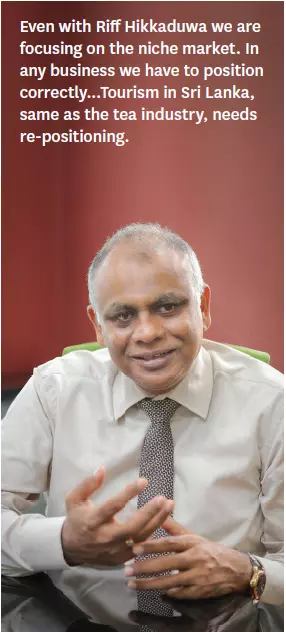
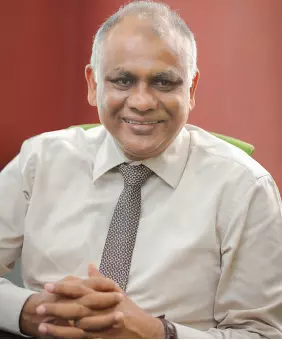
In 2007, when you started it was the height of the war and many were not very positive of the future. But you came in and introduced a niche market product. How did you take on that challenge at that time?
When you are to produce a niche market product the initial investment required is not very large. That is my thinking. We started initially as a very small company with a very few staff. We did not even have the factory and I outsourced everything. My risk at that time was minimal. But whatever we earned we reinvested in the marketing of the product. We participated in exhibitions and we gradually grew in our business. We have to take things positively and work towards achieving that target. I am a very quality conscious person and believe greatly in product differentiation and offering something better and unique to consumers whether it be tea or hospitality. My main focus in 2007 was to offer something unique to the market with highest quality teas, creative
and innovative designs and packaging. Even when it came to the hotel, when we decided to diversify, I wanted to do a boutique designer hotel where we gave attention to detail. For example, the floors are made of pure limestone and wood is being used greatly. All in all, we believe in differentiation and that is what we offer in our tea and also in hotel. I was a director of another company at that time and I could have simply stayed on but why I wanted to introduce a new brand, and the concept was to achieve what was in my mind. Give something better, unique and innovative. At the end of the day it is always a challenge and my intention has been to win them, all the time. Even the hotel is still new to me but I am learning every day. The hotel is like a hobby for me but I want to do it in style.
What are your plans in terms of the hotel for the coming year?
We hope to recover as soon as possible. We have maintained our staff capacity, except for the few who resigned, we have kept everyone else because I believe our staff is an asset. We have 48 dedicated staff at the moment. I believe that we will recover very soon because the Government too is moving towards a new direction. Maybe for another six months we will have to live with this COVID-19 situation until the vaccination becomes widely available. I hope we will recover soon. Tea and Hospitality are two unique sectors. Would you agree? Yes, they are two very different sectors. The approach in the tea industry and the hospitality industry are completely different. I feel we have to focus more on hospitality because tea is performing at a satisfactory level. It is a product and thus easier to handle. But in hospitality there are many factors to consider. It is about service and it concerns emotions; situations have to be handled in a delicate manner and there are many areas to consider.
In general, how should the tourism industry go forward?
Sri Lanka needs to reposition itself. If you take Maldives for instance they have created a market for themselves in the high-end category. Even when I was building Riff Hikkaduwa, the architect Vinod Jayasinghe asked me to price the rooms at a high level and not at the low level. We priced our standard rooms at USD 200 and we never came down on the price. This is not my main business that is why I can experiment with my pricing. If you are positioning anything properly, say tea or hotel or any product, consumers would continue to buy it or enjoy the services even at some extra cost. That is the psychological aspect of it. Business is all about psychology because it focuses on the areas to target in the mindset of the people. Sri Lanka has to reposition itself because we have not positioned ourselves with some value addition. Sri Lanka is a unique destination with so many unique things to offer, we don’t do that properly. Many people are coming here to stay at boutique hotels. There were properties that were selling for over USD 800-1,000 before the pandemic, and they were having guests. We can charge those prices but we have to provide the required services as well. In Sri Lanka, there is a limitation in trained staff because the salaries are not very high therefore people are moving out. That is an area of concern.
The private sector has had a major setback, should we be more proactive?
We always take crisis situations as a learning experience. At times it could be a blessing in disguise. In the present situation some markets are opening up and others are closing. Therefore, we thought positively, maybe that is the reason we are able to achieve success to a certain extent. When you look at the past trends, we struggle only for a couple of months and thereafter we pick up, and move on to the normal situation. Therefore, a crisis is an opportunity. We have to think positively. In the hotel industry many hotels have closed down, but we have remained open. We might have only one guest but we keep the property open. We want to give positive thinking to our staff as well. Sometimes I would pay and take friends to the hotel to keep the staff motivated. Otherwise they will be demoralized. There were many sacrifices but we took the entire situation as a positive and a source of motivation. We never gave up, that was the most important aspect. I ensured that I stayed with the company and the employees, which gave a huge morale boost to the company. Therefore, the staff of both the tea business and the hotel also worked hard to see ways of coming out of this situation.
I wanted to ensure that I was a strength to them because when I stay strong the company also will be positive. I never give up.
If you look at the design of your office and also the hotel it is very different. Your office is not like that of a tea company. What is the thinking behind that?
We always differentiate ourselves from the others. We feel free and I wanted to give everyone a nice environment to work. Even the hotel we are getting repeat customers because it is very homely and comfortable. Our employees also treat people well in a very welcoming manner. We are treating people in a human way than simply being business oriented.
You maintain a low profile. Why is that?
That is in my nature. I always want to achieve my goals quietly. Even though I do not talk about our achievements, our results speak for themselves. I have contributed to the trade and those in the tea and hospitality industry know about it. I want to show to the people in this country that we can do something differently. We do not have to copy, we can always find ways to do something diverse and showcase that to the world.
Can you tell us about yourself?
I studied in Russia after my schooling and I graduated as a medical doctor. I am married and have three children. As a matter of fact my wife and two of my eldest sons are working at Basilur with me. I lived in Russia for many years thereafter for business where I handled many tea brands. After completing my medical degree in 1993, I got involved in the tea industry from 1994 where I used to import tea into the Russian market. I started my tea journey in Russia. I was in the industry for many years but I started my own tea export company in 2007 to make my dreams come true through my own company.
Going forward?
A person must always make use of opportunities and never give up. It is a challenge. You must not give up in life and we must face any crisis in our lives. Whatever you do, you must position yourself properly. Life is a challenge, take it as an opportunity and always have a target on what you want to do. And, always be passionate in whatever you do.



